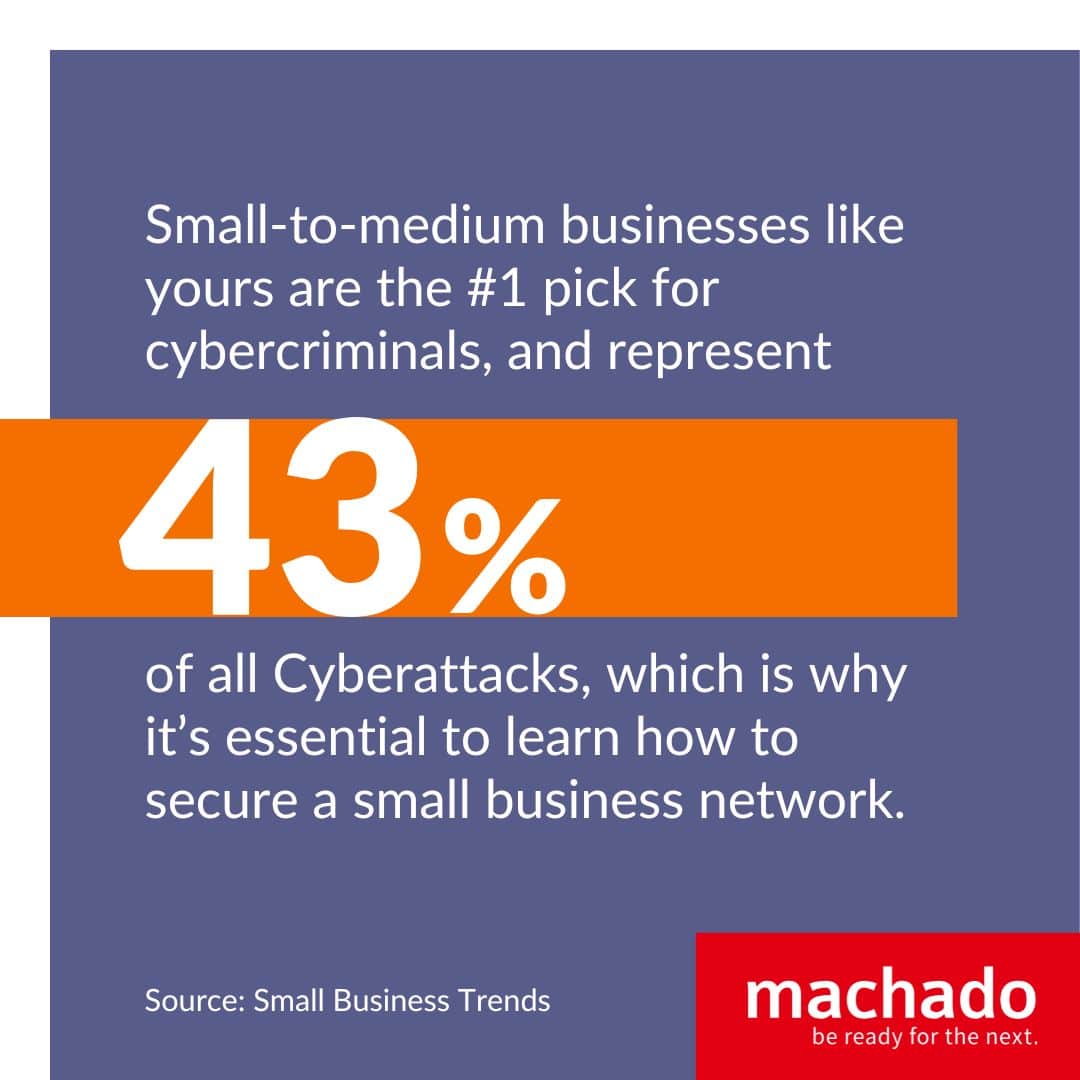TL;DR: Discover key strategies about how to secure your small business network, especially in professional services. Learn practical steps, tools, and strategies for safeguarding data through our 8-step comprehensive guide.
It’s a typical day. You start your morning by checking emails and responding to urgent client needs.
Then, you begin a series of meetings, discussing project timelines and deliverables.
By lunchtime, you’re multitasking between phone calls, managing your team, and perhaps squeezing in a quick bite at your desk. Your afternoon might be filled with client visits or strategic planning for the next big project. It’s a busy, fulfilling routine, driven by your expertise and commitment.
Now, imagine a sudden turn of events.
Your day is disrupted by a cybersecurity breach – a scenario increasingly common among SMBs nationwide, with Massachusetts being no exception in facing this challenge.
This is not just a cautionary tale, but a reality for many professionals who overlook the importance of proactive monitoring, and network security.
It’s a jarring interruption to the well-orchestrated schedule of your daily work life, and it can happen to anyone, at any time.
But here’s the good news, you can prevent this.
And the better news? You don’t need to be a tech wizard to do it. Our guide to network security is crafted for professionals like you – savvy, busy, and focused on what you do best.
Let’s learn why network security is vital for your professional practice, and how safeguarding your firm’s network is linked to the trust, integrity, and success of your business.
This isn’t about becoming a tech expert—it’s about understanding the critical role network security plays in the secure operation of your firm.
Network Security: Why It’s a Game Changer for Professional Services
For professionals in service-based industries, network security is much more than a technicality.
It’s an essential component of your business’s integrity and success.
Data breaches are not just a possibility but a frequent reality, about 2,200 cyberattacks occur each day. The significance of network security can’t be understated.
Whether your expertise lies in healthcare, finance, legal, or any other client-focused field, the protection of sensitive digital information is a primary responsibility. Learn why network security should be at the forefront of your business strategy.
Protecting Sensitive Client Data
In any professional service field, be it legal, consulting, healthcare, or financial services, you handle confidential client data.
A breach in network security could mean exposing sensitive information.
Think of the repercussions if private health records or critical financial details were leaked.
It’s not just about the immediate loss of data but the long-term damage to client trust and your firm’s reputation. Especially when specific industries, like healthcare, have stringent compliance standards such as HIPAA, making data security not just prudent but legally necessary.
Financial Impact and Loss Prevention
Recall the 2023 incident where the City of Lowell was hacked by ransomware group Play, targeting its municipal network? With 5 GB of secure data stolen and sold to the dark web. Instances like this remind us of the importance of learning how to defend a small business from the dark web.
It’s not just about the large cities or companies, SMB’s like yours are the #1 pick for cybercriminals, and represent 43% of all Cyberattacks, which is why it’s essential to learn how to secure a small business network.
It’s about the subsequent financial losses, including legal fees, compensation, and even ransom payments in some cases. For any professional service firm, a secure network isn’t just a protective measure, but a financial safeguard.
Business Continuity and Operational Stability
Consider this… what happens when a consulting firm’s network goes down due to a cyberattack?
Projects get delayed, client communication is hampered, and the firm’s operational efficiency plummets. Downtime like this can cost SMB’s like yours anywhere from $5,600-$9000 per minute.
In fields like real estate, architecture, or engineering, where project timelines and data accuracy are crucial, network interruptions can derail entire projects, leading to significant revenue losses and client dissatisfaction.
Effective network security ensures that your business operations aren’t just smooth but also resilient to cyber threats.
Competitive Edge in an Online World
Your clients are increasingly aware of data security.
A study finds that consumer data security is challenging for 55% of Americans. By investing in network security, you’re not just protecting your firm, you’re also positioning it as a secure, reliable choice in a competitive market.
This is especially crucial for professional services, where strong technological expertise is directly linked to client perception and trust
We’ve talked about why network security is a big deal for your firm.
Now, let’s get into the how.
We’re not going to bog you down with tech speak. Instead, we’ll walk you through some straightforward, effective ways to beef up your network security. Whether you’re new to this or looking to update your current systems, these tips will help you make sure your firm’s data is as secure as it can be.
Enhancing Your Firm’s Network Security
Effective network security is a critical aspect of running a professional service.
It’s not just about protecting data, it’s about safeguarding your firm’s reputation, client trust, and operational integrity.
Below are some practical strategies to strengthen your network security, each vital for keeping your firm secure and resilient.
Regular Risk Assessments
Conducting regular risk assessments is like giving your network a health check-up.
It involves scanning your systems for vulnerabilities, such as outdated software or unsecured access points. By identifying these weak spots early, you can patch them up before they become gateways for hackers.
Staying ahead of potential threats not only keeps your data safe but also maintains the trust your clients place in your services.
Firewalls and Antivirus Software
Think of firewalls and antivirus software as your first line of defense.
A firewall monitors incoming and outgoing traffic, acting as a barrier against unauthorized access. Antivirus software, on the other hand, continually scans for and removes malicious software.
Together, they form a formidable shield, safeguarding your network from a variety of cyber threats. Regularly updating these tools is crucial to defend against the latest cyber threats.
Data Encryption
Encrypting your data, both when it’s stored (at rest) and when it’s being sent (in transit), is like adding a secret code to your sensitive information.
Even if a breach occurs, encryption makes it incredibly difficult for the data to be deciphered and misused.
This is particularly crucial for professional service firms, where the confidentiality of client data is your primary concern. Encryption serves as a strong deterrent against data theft and helps in complying with privacy regulations.
Regular Software Updates
Keeping your software and systems up to date is an often overlooked yet critical aspect of network security.
Hackers frequently exploit flaws in outdated software, so regularly applying security patches and updates is vital.
Staying current with updates is a straightforward yet effective strategy for maintaining a resilient network.
Incident Response Plan
Having a Cyber Incident Report plan in place is all about being prepared for the unexpected. It involves outlining clear steps for identifying, containing, and recovering from a security breach. This preparedness not only minimizes the damage in the event of an attack but also ensures a quick return to normal operations. An effective response plan is a testament to your firm’s commitment to security and its capability to handle challenges proactively.
Implementing these strategies creates a strong security framework for your network, significantly enhancing your firm’s resilience against cyber threats. Remember, effective network security is an ongoing journey, not just a one-time setup.
After exploring why network security is crucial for your professional service firm, it’s time to turn our attention to how you can effectively implement it. Knowing the importance is one thing, but taking actionable steps is where the real change happens. This is especially true for SMBs, where resources might be limited but the need for security is just as critical.
Up next is a practical, easy-to-follow 8-step guide. This guide is specifically designed to help you build a strong and resilient network security framework, tailored to the needs of professional services.
A Comprehensive 8-Step Guide on How to Secure Your Small Business Network
Securing your professional service firm’s network is essential.
This detailed yet straightforward 8-step guide is designed to help you learn how to secure a small business network, and prevent cyberattacks from affecting your firm.
Step 1: Conduct a Security Audit
Begin with a thorough evaluation of your current network security.
This involves assessing your systems for potential vulnerabilities, such as outdated software, weak passwords, or unsecured Wi-Fi networks.
Understanding your vulnerabilities is crucial because it helps you prioritize the areas that need immediate attention. Consider seeking external expertise if necessary, to gain an objective view on how to secure a small business network.
Step 2: Implement Basic Cyber Hygiene
Cyber hygiene refers to the fundamental practices that keep your network healthy.
These include using strong, unique passwords for each system and regularly updating software to patch security vulnerabilities.
Also, ensure that your sensitive data, especially client information, is encrypted. Such simple practices significantly reduce the risk of common cyberattacks and data breaches.
Step 3: Educate Your Team
Human error is a leading cause of security breaches.
Regularly train your team on cybersecurity best practices.
This includes identifying phishing attempts, safe handling of sensitive information, and secure browsing habits.
Creating a culture of security awareness among your employees can significantly strengthen your firm’s overall cyber defenses.
Step 4: Develop a Response Plan
In the event of a security breach, a well-defined response plan is invaluable.
This plan should outline the steps for quickly identifying and containing the breach, communicating with relevant parties, and recovering compromised data.
A solid Cyber Incident Report (CIR) not only minimizes the damage but also ensures faster recovery, helping maintain client trust even in the face of a security incident.
Step 5: Regularly Backup Data
Regular data backups are your safety net against data loss due to cyberattacks, system failures, or other disasters.
Ensure that your business’s backup process is automated, secure, and covers all critical data. Additionally, periodically test your backups to confirm that data can be effectively restored when needed.
Step 6: Use Firewall and Antivirus Solutions
Deploying firewalls and antivirus software provides a strong first line of defense.
Firewalls act as gatekeepers for incoming and outgoing network traffic, blocking unauthorized access, while antivirus software helps detect and eliminate malware.
Regularly updating these tools is crucial for them to remain effective against new threats.
Step 7: Secure Your Email Communications
Given that business communication emails are often targeted by cybercriminals, enhancing email security is critical.
Implement measures like spam filters, email encryption, and two-factor authentication for email accounts.
Train staff to recognize and report suspicious email activities, such as phishing attempts and unusual attachment requests.
Step 8: Monitor and Review
Continuous monitoring of your network, coupled with database monitoring, is the perfect duo for suspicious activity and is key to early detection of potential threats.
Additionally, regularly review and update your network security measures to keep pace with evolving cyber threats and technological advancements. This ongoing vigilance ensures that your network remains resilient against emerging cyber challenges.
While the strategies outlined above are crucial for network security, we understand that implementing them might seem daunting, especially for small and medium-sized firms.
You might be thinking, “We don’t have a large IT team,” or “Our budget is tight.”
These are valid concerns, and you’re not alone in facing them.
Explore practical solutions and approaches tailored for SMBs in professional services. These solutions aim to maximize your security without overstretching your resources, ensuring that you learn how to secure a small business network effectively.
Addressing Network Security Challenges in SMB Professional Services
For small and medium-sized businesses in professional services, implementing network security might seem daunting.
Let’s break down how you can effectively manage this, considering common constraints like budget, IT expertise, and operational practicality.
Making the Most of Your Budget
It’s a common scenario, your budget is tight, but you know network security can’t be ignored. The key is to invest smartly.
You don’t need the most expensive solutions to achieve good security.
Start with the basics, like regular security audits to identify vulnerabilities and training your team to recognize common cyber threats like phishing. These are low-cost but effective steps. Additionally, explore scalable cloud-based security services, which often come with more manageable costs.
Tackling Limited IT Expertise
If you’re running a firm without a dedicated IT team, network security can feel overwhelming. Remember that some of the most effective security practices don’t require advanced technical knowledge.
For example, implementing strict access controls and ensuring regular software updates are straightforward yet powerful measures.
Balancing Security with Operational Ease
There’s a fine line between securing your network and maintaining ease of use, especially with the rise of remote work.
You need to ensure your team can work efficiently without compromising security. Start by securing your remote connections with VPNs and enforce strong, but manageable, password policies.
Regular training sessions can help your team understand the necessity of these measures, which, in turn, promotes a culture of security awareness.
We’ve looked at some real challenges you might face while ramping up your network security, especially in a smaller or medium-sized firm. Don’t worry, these aren’t roadblocks, they’re just speed bumps.
Overcoming Network Security Challenges in SMBs
For small and medium-sized businesses in professional services, addressing network security challenges is crucial yet achievable. Here’s how you can effectively secure and strengthen your professional service firm’s defenses.
Enhancing In-House Technical Expertise
One key challenge is often the lack of specialized IT knowledge. You can begin addressing this by investing in training for your current IT staff, helping them stay up-to-date with cybersecurity trends and practices.
Utilizing online resources and courses can also be a cost-effective way to boost your team’s skills. For specific projects or in-depth assessments, consider hiring or consulting with cybersecurity specialists. This approach allows you to improve your team’s capabilities without the need for a large, dedicated IT department.
Balancing Budget Constraints
Working within a limited budget requires strategic planning.
Prioritize the most critical aspects of your network security, such as securing sensitive data. Explore cost-effective solutions, like open-source security tools or cloud-based solutions, which offer flexibility and scalability.
Implementing preventative measures such as regular software updates and basic employee cybersecurity training can be more cost-effective than dealing with the consequences of a security breach.
Managing Remote Work Security
With the rise of remote work, ensuring off-site operations are secure is vital.
Secure remote access by using Virtual Private Networks (VPNs) and educate employees on the importance of secure home networks and strong password practices.
As remote work scenarios evolve, so should your policies and security measures, ensuring they are up-to-date and effective.
Scaling Security with Business Growth
As your business grows, your network security needs to scale accordingly.
Opt for security tools and measures that can grow with your firm, preventing the need for frequent overhauls.
Regularly review your security to ensure it aligns with your business’s current size and operations, adapting as necessary.
Addressing Compliance and Regulatory Requirements
Staying compliant with industry regulations can be daunting.
Keep your team informed about regulatory changes and seek advice from legal or cybersecurity experts specializing in your industry.
Compliance is complex, and expert guidance can prove invaluable.
Each of these strategies provides a pathway to strengthen your network security, tailored to the unique challenges faced by SMBs in the professional services sector.
We’ve outlined some key strategies to improve your network security, and while they’re undeniably effective, we recognize that they can seem daunting, especially when resources are stretched thin.
Implementing these measures requires time, expertise, and continuous effort, which might be challenging for many SMBs. This is where the concept of cybersecurity as a service comes into play. It’s an efficient way to access top-tier security expertise without the overhead of managing it all in-house.
Explore how enlisting a Managed Service Provider offering cybersecurity services can be a game-changer for your firm, simplifying these complex tasks and ensuring your network is protected.
Streamlining Your Network Security with a Cybersecurity MSP
Handling network security can be a hefty task for any SMB. This is where bringing in a Proactive cybersecurity Managed Service Provider (MSP) can make a significant difference.
Let’s see how an MSP can specifically address your firm’s network security challenges in a practical and efficient way.
Expert Tech Support with an MSP
Think of an MSP as your on-call IT specialist team. They bring the expertise needed to tackle complex cybersecurity issues, saving you the trouble and expense of managing an in-house IT security department.
An MSP keeps up with the latest developments in cybersecurity, offering your business top-notch protection and tailored advice without the cost of employing a full-time team.
Budget-Friendly Cybersecurity Solutions
Working with an MSP can be a smart financial move. They provide scalable cybersecurity solutions that match your budget, allowing you to access high-quality cybersecurity services without overspending.
MSPs understand the financial constraints of SMBs and offer flexible services that ensure your money is well spent on the most effective security measures.
Securing Your Remote Workforce
Ensuring your team’s online security outside the office is essential. MSPs are adept at setting up and managing secure remote work environments.
They use advanced tools and practices, like VPNs, to keep your remote connections safe. Plus, they educate your team on remote security best practices, ensuring that your employees can work securely from anywhere.
Adapting Security Measures as You Grow
As your business evolves, so do your security needs. MSPs excel in comanaged IT, and adapting their services to your firm’s changing requirements. Their expertise in how to secure a small business network ensures powerful protection that aligns with your business’s growth, and changing needs.
Simplified Compliance Management
Keeping up with industry-specific regulations can be challenging, but it’s crucial for your business. MSPs have a deep understanding of these cybersecurity and compliance requirements and manage them effectively.
They ensure that your network security adheres to the necessary standards, saving you the hassle and risk of going through these complex regulations alone.
Incorporating an MSP into your cybersecurity strategy not only strengthens your defenses against cyber threats but also ensures that your network security is comprehensive, up-to-date, and aligned with your business goals.
It’s a strategic partnership that offers peace of mind and lets you focus on growing your business.
Securing Your Firm’s Future: The Way Forward in Network Security
As we wrap up our exploration of network security for SMBs, it’s clear that taking proactive steps and making informed decisions are crucial.
We’ve covered the importance of network security, practical implementation strategies, and the advantages of partnering with cybersecurity service providers. This journey toward network security is continuous, adapting to emerging threats and your business’s growth.
If you’re looking to assess your current network security or explore ways to optimize it, we’re here to assist. Our team offers free tests and assessments, providing a comprehensive understanding of your network’s strengths and areas for improvement.
This is an opportunity to apply what you’ve learned about how to secure a small business network, and ensure your firm is not only protected against cyber threats but also ready for future success.
Don’t wait until a security breach to realize the need for solid network defense. Contact a cybersecurity service provider today, and make a significant move toward a more secure and thriving future for your business.
Download our guide to learn how you can get more done with your current IT staff.Be Ready for the Next IT Opportunity








